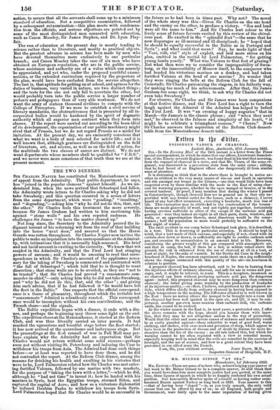THE TWO DINNERS.
CHARLES barns has constituted the Mansionhouse a court of appeal from the Admiralty. That public department, he says, has "joined in the popular clamour" against himself. As we un- derstand him, when the news arrived that Sebastopol had fallen, the Admiralty wrote letters to Sir Charles asking why he did not take Sweaborg; and this question occurred in a series of letters from the same department, which were "goading," " insulting," and " degrading,"—asking him " why he did not do this, that, and the other." Sir Charles feels this treatment the more severely, .because Sir James Graham had written to him cautioning him against " stone walls " and his own reputed rashness. He challenges Sir dames " to have the matter cleared up." Not long since, the Secretary to the Admiralty poured the in- dignant torrent of his reforming wit from the roof of that building into the house "next door," and assured us that the Horse Guards was rotten throughout. Sir Charles Napier now invites the public to make an inquisition into the correspondence at the Admiral- ty, with intimations that it is unusually high-seasoned. His brief and not lucid account is exciting to the curiosity. We knew that wit resided in the Admiralty, and that the First Lord had stinging powers of sarcasm ; and it would be amusing to read that corre- spondence in which Sir Charles's account of the appliaxtces neces- sary for the taking of Sweaborg is commented and contrasted with " the fall of Sebastopol "• which told that he is thought to want discretion ; that atone walls are to be avoided, as they are " not to be trusted" • that Sir Charles had proved "a consummate com- mander-in-chief,"—only asking him why he did not take Sweaborg, and "why he did not do this, that, and the other"; and giving him such advice, that if he had followed it "he would have left the fleet in the Baltic." One suspects that the official correspond- ence is a tissue of pleasantry, throughout which the irritable but "consummate" Admiral is relentlessly roasted. This correspond- ence would be incomplete without his own contributions, and the Trench share—and the signals.
The Banjo expedition began with a dinner, it ends with a din- sier, and perhaps the beginning may throw some light on the end. The expedition closesat the Mansionhouse, it started at the Reform Club, and was thus literally carried on inter pocula. It had reached the uproarious and boastful stage before the fleet started; it has now arrived at the quarrelsome and lachrymose stage. But the proceedings at the first council of war in Pall Mall may per- haps explain why the Admiralty had an expectation that Sir Charles would not return without some solid success—perhaps even not without visiting St. Petersburg and inducing the Czar to withdraw his troops from Asia. The Admiral had done such things before—or at least was reported to have done them, and he did not contradict the report. At the Reform Club dinner, among the reasons for drinking his health and exulting in his victories that were to be, Lord Palmerston related how Sir Charles was met enter- ing fortified Valenza, followed by one marine with two muskets, for the purpose of " taking the town with a letter,"—which he did, although he "had not time" to invest it; how he landed with his marines in Syria, beat the Egyptian troops, stormed Sidon, and captured the capital of Acre; and how as a victorious diplomatist lie induced Ibrahim Pasha to withdraw his troops from Syria. Lord Palmerston hoped that Sir Charles would be as successful in the future as he had been in times past. Why not? The moral of the whole story was this—Given Sir Charles on the one hand and the enemy on the other, to produce a victory. "Sea and land were all the same to him." And Sir Charles lent colour to the lively sense of future favours excited by this review of the chival- rous past. He exulted in the " splendid fleet"—the same that he now disparages as ill-manned and ill-disciplined; he " hoped that he should be equally successful in the Baltic as in Portugal and Syria"; and what could that mean ? Nay, he made light of that " Veni, vidi, viol" style of exploit, and laid more stress on his plan, omitted in the recital by Lord Palmerston, " for getting young lambs yearly." What was Valet= to that feat of grazing? But what then were we to consider the impregnability of Swea- borg, or the inaccessibility of Moscow itself, to the conqueror who bad headed his victorious marines on a donkey, and had taken fortified Valenza at the head of one marine P No wonder that they were ringing the bells at the Reform Club for the fall of Cronstadt; Sir Charles patronizing the ringers, in his fatherly way, for making too much of his achievements. After that, Sir James Graham has some right, we think, to ask why Sir Charles did not even take Sweaborg ?
For observe, Sir Charles and Sir James were boon companions at that festive dinner, and the First Lord has a right to turn the laugh against the Admiral if the Admiral has helped to befool the First Lord. It was "an evening of happy auguries" that in March—Sir James's is the classic phrase ; and " when they next met," he observed in the fulness and simplicity of his heart, " it might be to celebrate a triumphant success." " Cheers." Now Sir Charles answers that aspiration of the Reform Club dessert- table from the Mansionhouse dessert-table.


































 Previous page
Previous page